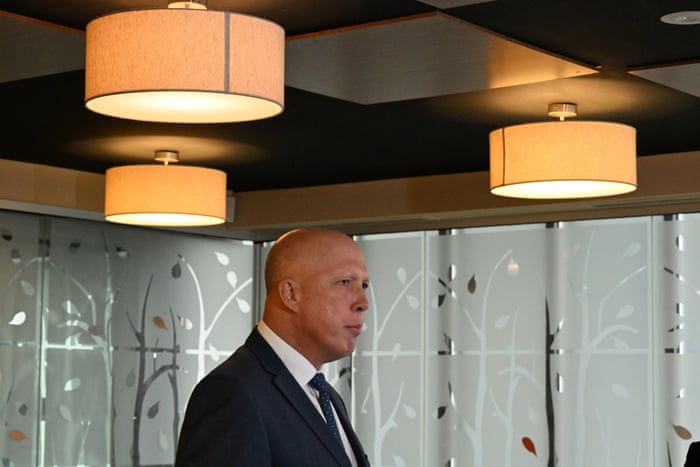
Peter Dutton says Australia should shut border to Indonesia over foot-and-mouth scare

Paul Karp
After the Coalition was divided last week on whether the Albanese government should shut the border to keep foot-and-mouth disease out, the Liberal leader, Peter Dutton, has further evolved his position.
Dutton told 2GB:
I believe the borders should be closed, absent the information the government’s got … If there’s an argument why the border shouldn’t be closed, that’s for the prime minister to make. If he’s got a reason, then let him explain it.
Dutton confirmed his position is that the border should close, unless there is “some significant piece of intelligence that this is under control”.

Dutton also called on Anthony Albanese to “take the lead, not the hapless [agriculture] minister in Murray Watt, the most junior minister, who I don’t think instills anyone with confidence”.
Dutton said the government was “playing with a loaded gun” because if FMD gets into Australia, hundreds of thousands of livestock will be slaughtered, an $80bn export industry will shut down, it will take years to recover and prices of meat at the checkout will be “through the roof”.
Key events
There have been a few questions about what happens tomorrow, when the 47th parliament officially opens.
For those who haven’t been part of a first sitting week of the parliament, there will be a few bits of pomp and ceremony to get through.
Don’t expect anything to actually happen tomorrow in terms of parliamentary proceedings.
There will be a Welcome to Country ceremony in the Great Hall.
Then the Chief Justice of the High Court, Susan Kiefel will show up, along side Justice Stephen Gageler. Kiefel, as the deputy of the Governor-General, will walk walk into the senate (which is officially known as ‘attending’ the senate) and address the members of both the senate and the house of representatives.
The new senate president and speaker of the house will be elected (fun fact – the previous senate president and speaker remain in place (with pay packets) until new people are elected, so Slade Brockman and Andrew Wallace have stayed in those positions).
The Governor-General, David Hurley will arrive in the early afternoon, there will be a royal salute and inspecting of the guard and then he heads into the members’ hall, where the newly elected senate president and speaker of the house will welcome him.
Hurley will then head into the senate and summon the house of representatives (the Queen’s representative stays out of the house, as it is the people’s house) and once everyone is in the red chamber, he addresses the MPs, and the parliament is open.
There is a 19-gun salute (21 gun salutes are reserved for royalty and heads of state) on the parliament forecourt, and then the GG leaves (about 4.40pm)
After all of that, the House will re-commence its sitting from 5pm.
Your parliament questions answered: question time

Rafqa Touma
What on earth does ‘I move that member be no longer heard’ mean?
Remember those standing orders we explained a little earlier? Well, under those rules in the House of Representatives, a member of parliament can propose that the member speaking “be no longer heard”. Basically, it is trying to get the member to stop their speech.
If the House votes in a majority to move the proposed motion, the member speaking must immediately stop talking and sit back down.
There is no procedure like this in the Senate (only the President of the Senate can warn of irrelevance and discontinue a parliamentarian’s speech).
In the House, the former government would “move the member no longer be heard” almost every time there was a motion to suspend standing orders, which Labor argued was shutting down debate. It will be interesting to see how Labor handles these interruptions to the schedule.
What is question time?
Each parliamentary day includes a dedicated “question time”. When question time rolls around, all the members are present in the chamber and, usually, the most topical, challenging and controversial conversations are had.
Backbenchers ask the questions of ministers in the government (usually written by either the minister’s staff, or the staff from the manager of government’s business office). These are usually on issues the government wants to talk about and are called “dixers”.
Shadow ministers ask the questions of ministers, and these are the questions to pay attention to. The minister can answer – or not answer – the question in any way they like. The Speaker is supposed to make sure they stay on topic, but there is usually a pretty slim link to the question. And no, the minister does not have to answer the question either – and there are no repercussions for when that happens.
Question time is usually held for an hour, but it is at the prime minister’s pleasure, meaning it is the PM who calls time on it. That can be abused when it suits the government. Malcolm Turnbull once allowed question time to keep going and going as his government tried to run down the clock on a Medevac bill vote it didn’t want held. Scott Morrison would cut QT short when there was an issue he didn’t like being prosecuted by the Labor shadow ministers.

What does it mean when a question is ‘put on notice’?
Sometimes a minister is asked a question during question time that they cannot or do not want to answer. The question is then “taken on notice”, and will be responded to later in writing.
The answer, once prepared, is always available on the parliament’s public record. There is no time limit in which the question has to be answered. But for the House of Representatives, if it has been 60 days and the minister hasn’t replied, they can be asked for an explanation.
Is that different to ‘questions on notice’?
Yes! There is a difference between a question being “put on notice” and “questions on notice”. Questions on notice are written questions to a minister from a member of Parliament, usually asking for detailed information. The answers are also published.
The Greens are also holding a party room meeting today – with a few new faces.
That will be held from 2pm, including with the new senators and the three new Queensland MPs.

Rafqa Touma
Anticipation in the air at parliament house this morning
Reporter Rafqa Touma is interning with us in Canberra this week – I asked her to take a look around and see what the mood was in parliament house this morning:
A soft fog lays low over tiles at the Parliament House entrance this morning. More feet than usual are being welcomed into its Marble Foyer.
Photographers lug heavy camera lenses up stairwells and the clicking of shoes of people in suits blurs into one sharp echo.
All Department of Parliamentary Services staff are wearing masks. The journalists and staffers running about, not as much.
Anticipation of the Albanese government’s first parliamentary sitting tomorrow has stirred a collective hum in the air. Or perhaps it is the building tension of a government expected to face its first test on climate, with the Greens leader, Adam Bandt, pushing for greater emission reduction targets.

Greens back ABCC abolishment

Paul Karp
The Greens leader, Adam Bandt, has backed Labor’s policy to abolish the Australian Building and Construction Commission.
Bandt said:
The ABCC has got to go. For some time the Greens have had that position for a number of years, and we took it to the election.
The ABCC is an affront to the rule of law. You should not have fewer rights at work just because you happen to work in a dangerous industry like construction – that is the situation at the moment.
… people in dangerous industries have fewer rights at work than colleagues in other industries because they have to work in construction .. The sooner [the ABCC] is gone, the better.
The workplace relations minister, Tony Burke, announced on Sunday that Labor will introduce a new bare-bones building code stripping the body’s powers back.
The new code is a disallowable instrument, but with Labor’s 26 senators and the Greens’ 12, that’s exactly half the Senate: not enough to pass legislation by themselves, but enough to block a disallowance.
Rafqa’s report on Adam Bandt and his mention of the budget reminds me – you’ll be hearing Jim Chalmers’ economic statement this week.
The treasurer has vowed to lay out “exactly” the state of the budget and the Australian economy ahead of Labor’s budget being handed down in October.

Rafqa Touma
Bandt: government’s 43% emissions reduction target is ‘too weak’
The Greens leader, Adam Bandt, is urging the government to strengthen their climate bill and emission reduction target, which he says is “too weak,” among other issues.
He told Laura Jayes on Sky News:
It doesn’t really compel the government to do anything. At some stage, the penny is going to drop.
We don’t want legislation to be a break on any future government that decides they don’t want to do more.
One of those [issues] is making sure this bill is a genuine floor – it can’t go below.

He paints us a hypothetical picture:
Pauline Hanson … we don’t want someone like that to be able to say, no we don’t want targets locked in law.
Why put obstacles in the way of more ambition governments in the future?
Bandt urged the government give people “incentives to get off fossil fuels” and into electricity [for their vehicles].
The big gas corporations, who are holding this country ransom, have to pay their fair share.
At the moment the government is saying we want more coal and gas … scientists are screaming at us, saying keep this in the ground … To make net zero by 2050 … you can’t have any coal or gas projects, starting now.
The advice is crystal clear.
This comes off the back of negotiations over the Labor government’s climate bill and 43% emissions reduction target anticipated later today.
Your parliament questions answered: backbenchers and committees

Rafqa Touma
What are backbenchers?
Our Parliament has both frontbenchers and backbenchers. If you imagine the layout of the House of Representatives; the front row of seats facing the speakers are where the ministers (frontbenchers) sit, and the backbenchers sit behind them.
Backbenchers are members of parliament who are not ministers or shadow ministers. They represent their electorate by debating and voting on proposed laws and bring up issues that their electorate care about. You will find a lot of their speeches just before parliament closes (when they have speaking spots) and in the federation chamber.
But without their votes, governments can’t pass its legislation in the House. In the Liberal party, where MPs can vote against legislation without ramifications, this gives them a lot of power. For Labor, voting against a caucus decision means expulsion from party, so it is a little more tricky for them.
What are committees?
Parliament can appoint a group of up to 10 members of parliament to investigate specific issues or proposed laws. This is a Select Parliamentary Committee.
The committee invites submissions on the issue from experts, interest groups and the community. They also hold public hearings where they can hear directly from these groups.
Their findings are reported back to the House, so parliament is well informed before making any big decisions about those issues or laws.
Some committees never stop running, continuously examining issues like employment or education. These are called Standing Committees. And yes, MPs are paid more to be on a committee, or to chair it.
The parliament considers the committee’s findings, but it doesn’t mean it will adopt them. Some, such as the intelligence committee, usually have their recommendations taken up (there have been rare occasions under the last government where this doesn’t happen) which sees legislation amended; others have their recommendations and reports completely ignored (the report into question time, for example).
Labor: traveller compliance with foot-and-mouth disease measures is up
After criticism that not all passengers returning from Indonesia have been screened for foot-and-mouth disease at their Australian return port, Murray Watt has released this statement:
Biosecurity officers at international airports have reported improved compliance from returned passengers from Indonesia over the weekend, as the Albanese government’s strong measures to keep FMD out of Australia continue to ramp up.
All passengers returning from Indonesia were risk assessed by border officials, which led to nearly 3,700 travellers more intensively being assessed or questioned by biosecurity officers in Melbourne Airport on Saturday alone.
The rates of undeclared FMD risk items and undeclared contaminated footwear was also drastically down compared with last week.
The increased compliance comes as airports that receive direct flights from Indonesia will begin to roll out sanitisation foot mats this week.
Darwin, Adelaide, Perth, Sydney and Melbourne Airports have all taken delivery of the foot mats with some having started testing them prior to use, with other airports expected to follow in the coming days.
It is important to remember that these foot mats are not a silver bullet to keep FMD out of Australia but provide another layer of protection in addition to measures already imposed.
You may remember one of the first blow ups with the new government was over the staffing allocations for the non-major party and independent MPs.
Paul Karp has been following the story:
ICYMI Anthony Albanese has already softened staffer cuts – but only for One Nation and David Pocock (so far). PMO is meeting Jacqui Lambie today. Xbench MPs still haven’t had any joy.https://t.co/cz7Wxjcni8
— Paul Karp (@Paul_Karp) July 25, 2022
And of course, before standing orders can be suspended, there is the motion to suspend standing orders (which you may be familiar with after the last parliament).
These moves often fail in the House, because the government has the numbers and if it chooses to block something, it is usually blocked.


